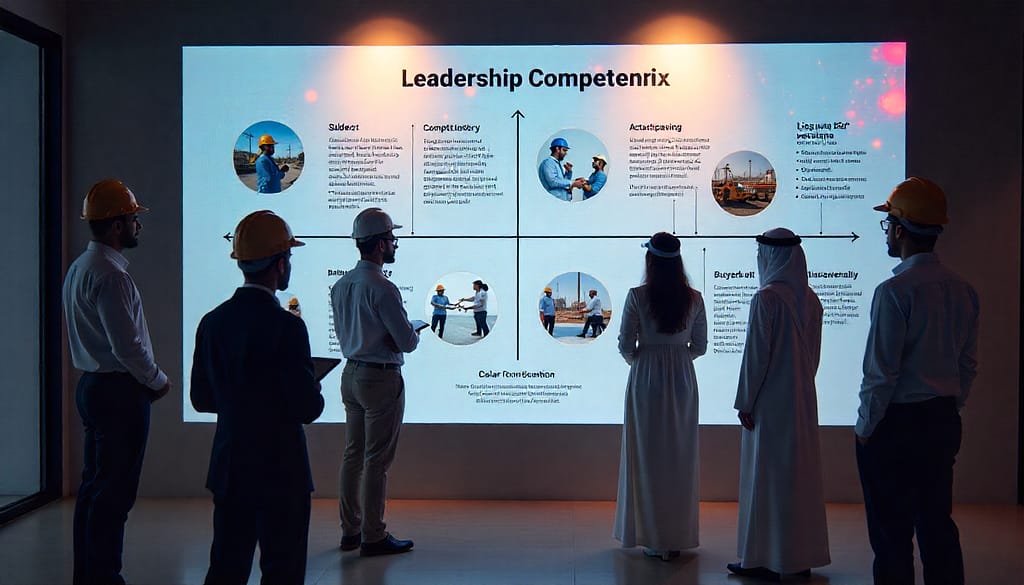Executive Summary
Competency Frameworks for Leadership are essential tools for organizations aiming to develop and assess leadership capabilities systematically. These frameworks define the skills, behaviors, and knowledge required for effective leadership, ensuring alignment with business goals and cultural expectations. In today’s evolving workforce, particularly in regions like the UAE, Saudi Arabia, Kuwait, and Europe, these frameworks play a critical role in global hiring strategies. They help organizations navigate legal complexities, cultural diversity, and talent shortages while fostering leadership excellence. By implementing structured Competency Frameworks for Leadership, companies can enhance employee performance, succession planning, and long-term organizational success.
Chapter 1: Introduction to Competency Frameworks for Leadership
Competency Frameworks for Leadership provide a structured approach to identifying, developing, and evaluating leadership skills within an organization. These frameworks are crucial in today’s globalized business environment, where leadership demands vary across regions due to legal, cultural, and HR considerations. For instance, in the UAE, leadership competencies must align with Emiratization policies, while in Europe, frameworks often emphasize inclusive leadership and compliance with GDPR. Real-world examples, such as Dubai’s MOHRE initiatives, highlight the importance of localized leadership development. Similarly, the European Commission’s leadership programs showcase region-specific competency models. Competency Frameworks for Leadership ensure consistency in leadership expectations, bridging gaps between organizational goals and individual performance. By integrating these frameworks, businesses can foster adaptability, ethical decision-making, and cross-cultural competence—key traits for modern leaders.
Chapter 2: Best Practices for Competency Frameworks for Leadership
Detailed Strategies and Methodologies
Implementing Competency Frameworks for Leadership requires a strategic approach. Best practices include conducting thorough competency assessments, aligning frameworks with organizational values, and leveraging data-driven insights for leadership development. For example, multinational corporations often use 360-degree feedback to evaluate leadership competencies, ensuring a holistic view of performance. Case studies from companies like Siemens demonstrate how tailored competency models improve succession planning and employee engagement. Additionally, integrating technology, such as AI-powered analytics, can enhance the accuracy of competency evaluations and identify skill gaps proactively.
How Allianze HR Consultancy Helps
- Free Hiring Model: Allianze HR Consultancy offers a zero-cost hiring model for job seekers, eliminating financial barriers and attracting top-tier talent. This approach ensures a diverse and qualified candidate pool while maintaining transparency.
- Ethical Sourcing: Allianze prioritizes ethical recruitment practices, sourcing talent from South Asia with full compliance to labor laws and international standards. Rigorous vetting processes and partnerships with local authorities ensure fair treatment of candidates.

Allianze’s services extend beyond recruitment, offering leadership assessment tools and customized training programs to align with Competency Frameworks for Leadership. Their expertise in cross-border hiring simplifies compliance with regional regulations, making them a trusted partner for businesses in the UAE, Saudi Arabia, and beyond.
Chapter 3: Common Challenges and Solutions
Organizations often face challenges when implementing Competency Frameworks for Leadership. Below are five common issues and actionable solutions:
- Cultural Misalignment: Leadership expectations vary across regions. For example, hierarchical cultures in the Middle East may conflict with collaborative leadership styles in Europe. Solution: Customize frameworks to reflect local cultural norms while maintaining core organizational values.
- Legal Compliance: Navigating labor laws, such as Kuwait’s private sector quotas, can complicate leadership hiring. Solution: Partner with legal experts and HR consultancies to ensure adherence to regional regulations.
- Skill Gaps: Identifying and bridging leadership skill gaps is a persistent challenge. Solution: Use competency assessments and targeted training programs to develop critical skills.
- Resistance to Change: Employees may resist new competency models. Solution: Foster buy-in through clear communication, leadership endorsement, and pilot programs.
- Measurement Difficulties: Quantifying leadership competencies can be subjective. Solution: Implement data-driven tools, such as performance analytics, to objectively evaluate leadership effectiveness.
Checklist: Best Practices
- Use job descriptions that respect local laws. For example, UAE’s labor law mandates specific requirements for Emirati hiring quotas. Ensure job ads comply with these regulations to avoid penalties.
- Offer relocation support. Provide housing assistance, visa sponsorship, and cultural orientation to ease transitions for international hires, improving retention rates.
- Partner with ethical agencies like Allianze. Ethical agencies prioritize fair wages, transparent contracts, and candidate welfare, reducing legal risks and enhancing employer branding.
- Use regional keywords in job ads. Terms like “Dubai-based leader” or “KSA leadership roles” improve visibility in local job searches. Research regional trends using tools like Google Keyword Planner.
Conclusion
In conclusion, Competency Frameworks for Leadership are indispensable for organizations navigating the complexities of global talent management. These frameworks ensure leadership development aligns with business objectives, cultural expectations, and legal requirements. To summarize, successful implementation requires customized strategies, ethical recruitment practices, and continuous evaluation. Ultimately, businesses that prioritize Competency Frameworks for Leadership will gain a competitive edge in talent acquisition and retention. Five final tips include: 1) Tailor frameworks to regional needs, 2) Leverage technology for competency assessments, 3) Foster leadership buy-in, 4) Partner with ethical recruiters, and 5) Continuously update frameworks to reflect evolving workforce trends.
About Allianze HR Consultancy
Allianze HR Consultancy is a leading recruitment firm specializing in ethical, zero-cost hiring for businesses across the UAE, India, Nepal, Kuwait, and Saudi Arabia. With a mission to bridge talent gaps through transparent and compliant practices, Allianze offers end-to-end recruitment solutions, including leadership assessment, onboarding support, and workforce planning. Their services are tailored to meet regional labor laws and cultural expectations, ensuring seamless integration for both employers and candidates. Success stories from clients highlight Allianze’s commitment to excellence and fairness in hiring. Contact us today to streamline your recruitment needs and build a future-ready leadership team.


